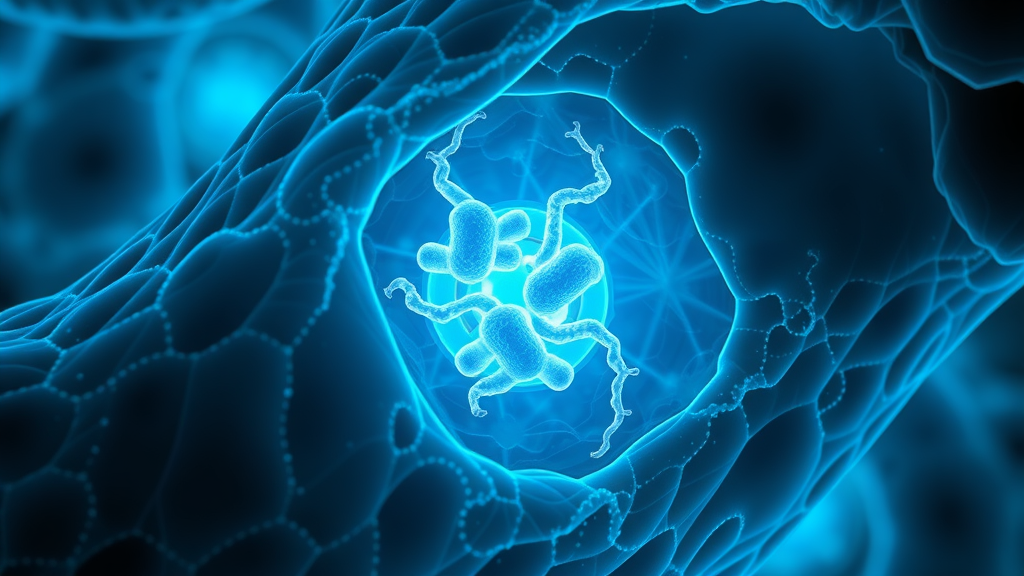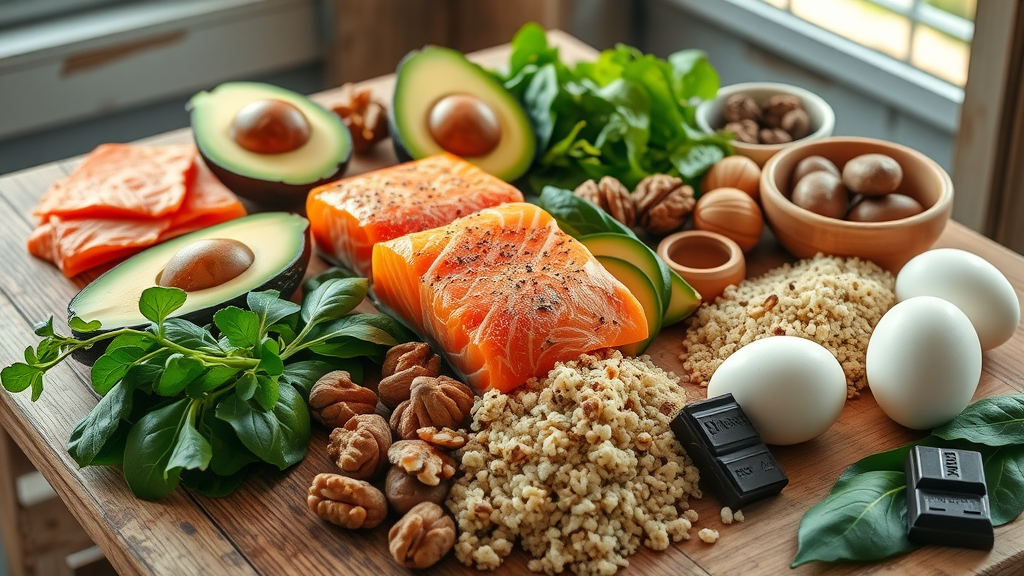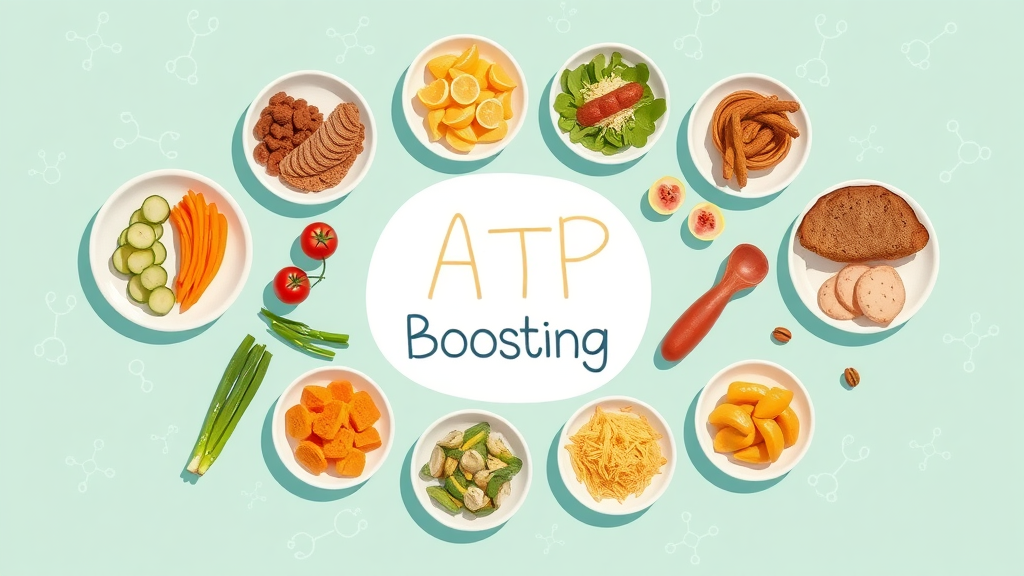Did you know the average human body turns over its own weight in ATP every day? ATP isn’t just a “science word”—it fuels every cell in your body, powering your movements, thoughts, and recovery from fatigue. If you’ve ever wished for more lasting energy, improved mental clarity, or quicker post-exercise recovery, increasing your ATP levels naturally could be the answer. Read on and unlock the secret to vibrant daily energy, peak focus, and optimal wellness.
Unlocking Your Energy Levels: The Startling Role of ATP in Everyday Vitality
To truly boost your energy levels , you must understand ATP (adenosine triphosphate)—the “energy currency” exchanged by every cell in your body. Each day, your body rapidly uses and regenerates ATP to fuel everything from muscle contractions to brain function . Increased ATP means improved focus , stamina for your muscles, and a foundation for quick recovery after stress or exercise. But when your ATP supply dwindles, you experience that dreaded low energy slump, brain fog, and slow muscle recovery—symptoms that undermine your daily performance.
By prioritizing strategies that increase ATP naturally , you can energize your muscle cells , supporting everything from sharper thinking to swifter physical recovery. Whether you’re an athlete or navigating a busy workday, understanding ATP’s role in your vitality is essential for lasting well-being and productivity.

-
Did you know that the average human body turns over its weight in ATP every day? Explore how increasing ATP naturally can profoundly enhance energy levels, mental clarity, and physical recovery.
What You Need to Know to Increase ATP Naturally for Energy and Health
ATP production is fundamental to sustained vitality. Its science revolves around how efficiently your body’s mitochondria —tiny powerhouses within each cell—produce ATP from the food you eat and the air you breathe. When mitochondrial function improvement is optimised, your body delivers more energy to muscle cells and your brain, helping to combat fatigue and restore your energy levels quickly.
Optimizing ATP pathways not only enhances muscle mass and brain function , but also reduces the side effects of low energy including sluggishness and poor concentration. High-performing mitochondria protect you against the negative impacts of oxidative stress—unstable molecules that can damage cells if left unchecked. By learning to increase ATP naturally , you’re taking the first step toward resilient health, sharper mind, and stronger body.
-
Understand the science of ATP production, why it matters for muscle cells, and how optimized ATP levels counteract low energy and fatigue.
ATP Production Explained: Where Does Your Cellular Energy Come From?
The Science Behind ATP Production & Mitochondrial Function Improvement
At the cellular level, your body produces ATP through a series of complex processes in the mitochondria . Think of mitochondria as mini power plants: they take in nutrients (like fatty acids and glucose) and, using oxygen, transform them into ATP through the electron transport chain —a sequence of protein complexes embedded in the mitochondrial membrane . This process is called oxidative phosphorylation and is responsible for the bulk of your daily energy production .
Healthy mitochondrial function ensures that the chemical bonds in nutrients are efficiently broken down, releasing energy to form ATP. If your mitochondria become sluggish or damaged—a condition known as mitochondrial dysfunction —all aspects of cellular function suffer. This not only leads to low energy , but can also impair muscle cell functioning, reduce brain function , and slow recovery from physical activity. Keeping your mitochondria robust is central to increasing ATP naturally and supporting energy levels throughout life.

-
Gain insights into how ATP is produced in the mitochondria and why healthy mitochondrial function is crucial for high energy levels.
Muscle Cell Energy & Why ATP Levels Drop
Your muscle cells draw on dense pools of ATP to produce strong contractions. Whether you’re lifting weights or running, each movement requires thousands of ATP molecules to break chemical bonds and generate force. After intense or prolonged exercise, ATP reserves dip, and without rapid regeneration, your muscle mass weakens and fatigue sets in.
Low ATP levels can also stem from mitochondrial dysfunction —where impaired mitochondria fail to generate adequate energy, even at rest. This manifests as chronic fatigue, diminished exercise capacity, and slower muscle recovery. By understanding and addressing the factors that deplete ATP, such as oxidative stress, poor nutrition, or lack of movement, you can take actionable steps to rebuild your body’s energy currency naturally.
-
Examine how muscle cells rely on ATP to function, and the effects of low ATP levels and mitochondrial dysfunction.
What Causes Low Energy? Recognizing Signs of ATP Deficiency

Feeling low energy mid-afternoon or after a workout? This fatigue might signal impaired ATP production . Everyday symptoms include brain fog, weak muscles, slowed reflexes, and general dissatisfaction with daily activities. More subtle signs are slow healing, frequent muscle cramps, or persistent aches—meaning your muscle cells struggle to keep up with repair and recovery.
One major contributing factor to ATP deficiency is oxidative stress . This occurs when reactive oxygen species , a byproduct of normal cellular metabolism, start to build up faster than your body’s antioxidant systems can clear them. Left unchecked, this imbalance hinders healthy mitochondrial function , lowering your energy levels and leaving you feeling perpetually drained.
-
Identify symptoms of low energy, oxidative stress, and the warning signs of impaired ATP production in everyday life.
Natural Ways to Increase ATP: Nutrition, Lifestyle, and Science-Backed Tips
Prioritize Nutrients for ATP Production: Foods & Supplements
The foods you choose every day supply the building blocks your body needs to produce ATP . Key nutrients for ATP synthesis include fatty acids , which the body converts into energy-rich molecules via the mitochondrial electron transport chain , and B-vitamins, which play a critical role in the steps that generate ATP. Magnesium acts as a cofactor for the ATP synthase enzyme, while antioxidants like vitamin C and E neutralize reactive oxygen species to protect mitochondrial function .
Boost your intake of omega-3-rich fatty fish, nuts, seeds, leafy greens, and whole grains. Supplements like CoQ10, alpha-lipoic acid, and magnesium can also help, but always consult a healthcare provider before significant dietary changes. Ultimately, getting these nutrients from real foods offers lasting benefits for both energy levels and whole-body health.
-
Explore which foods are rich in fatty acids, B vitamins, magnesium, and antioxidants, and their roles in boosting ATP levels naturally.
Top Foods That Increase ATP Naturally
|
Food |
Main Nutrient |
How It Boosts ATP |
|---|---|---|
|
Salmon |
Omega-3 Fatty Acids |
Supports mitochondrial membranes, enhances energy production |
|
Avocado |
Monounsaturated Fats, Magnesium |
Provides raw materials for ATP synthesis, stabilizes muscle cell energy |
|
Walnuts |
Polyunsaturated Fats, Antioxidants |
Protects against oxidative stress, supports healthy mitochondria |
|
Spinach |
B Vitamins, Magnesium |
Essential for ATP production and healthy mitochondrial function |
|
Quinoa |
Complex Carbohydrates, Magnesium |
Slow-release fuel to produce ATP steadily throughout the day |
|
Eggs |
Protein, Choline, B Vitamins |
Supports repair of muscle mass and cellular energy needs |
|
Dark Chocolate |
Flavonoids, Magnesium |
Reduces oxidative damage, enhances mitochondrial activity |

Lifestyle Changes to Produce More ATP: Exercise, Sleep, and Sun Exposure
Beyond food, lifestyle habits have a powerful influence on your ability to produce ATP . Regular physical activity —especially aerobic exercise and resistance training—stimulates mitochondrial biogenesis , meaning your body creates more mitochondria to meet energy demands. Better still, movements like brisk walking, cycling, or resistance workouts help train your body to use fatty acids as fuel, which in turn generates more ATP.
Consistent, quality sleep is equally important for ATP regeneration. During deep sleep, the body goes into repair mode, flushing out waste and replenishing cellular energy supplies. Exposure to sunlight or natural light, particularly in the morning, helps align your circadian rhythm, optimizing mitochondrial function and boosting energy through the day.
-
Evidence-based ways to improve energy levels and mitochondrial function through movement, circadian alignment, and healthy sleep habits.

How to Increase ATP Quickly: Rapid Techniques for Energy and Recovery
Sometimes you need an energy boost without waiting days or weeks. To increase ATP quickly, focus on hydration—water is vital for all cellular function and helps transports nutrients into muscle cells for instant ATP regeneration. Try quick, intense movements such as interval training or bodyweight circuits to stimulate muscle mass and rapid mitochondrial activity. Simple breathwork, such as deep diaphragmatic breathing, increases oxygen supply, fueling the mitochondrial electron transport chain to pump out ATP.
Even a few minutes of stretching, sunlight, or a cold splash of water can awaken sluggish energy pathways by invigorating the nervous system and cellular metabolism. Think of these quick actions as rapid reboots for your body’s innate battery—especially during stressful days or post-exercise slumps.
-
Immediate strategies to naturally increase ATP: hydration, breathwork, and specific exercises.
Which Foods Increase ATP? A Dive into Energy-Boosting Nutrition
-
Salmon – Packed with omega-3 fatty acids for healthy mitochondria and robust ATP production.
-
Avocados – Rich in magnesium and healthy fats; supports muscle energy and bone health.
-
Walnuts – Polyunsaturated fats shield mitochondria from oxidative stress, aiding ATP output.
-
Spinach – Loaded with B vitamins and magnesium to power cellular function .
-
Quinoa – Complex carbs and minerals for steady, all-day fuel.
-
Eggs – Complete source of protein and B vitamins to restore muscle mass and energy.
-
Dark Chocolate – Rich in antioxidants that protect against oxidative stress and improve brain function .

What Generates More ATP? Optimizing Mitochondrial Function
Boosting ATP Production via Exercise and Metabolic Flexibility
For lasting energy, train your body to toggle between fuel sources—carbs, fats, and even proteins. Metabolic flexibility means your cells efficiently use fatty acids and glucose to produce ATP as needed. Regular exercise, especially workouts that challenge both strength and cardio, increases the number and quality of your mitochondria (mitochondrial biogenesis) and enhances the electron transport chain —all critical for higher ATP output.
Adapting your routine with interval training, weight lifting, and endurance exercises not only develops muscle mass , but also supports mitochondrial function and resilience against oxidative stress . The more robust and flexible your metabolic system, the more ATP you can unleash for both peak performance and rapid recovery.
-
How regular activity and metabolic adaptations (like using fatty acids for energy) create powerful increases in ATP production.
Combatting Oxidative Stress and Mitochondrial Dysfunction
Oxidative stress —triggered by an overload of reactive oxygen species —can damage mitochondrial DNA, disrupt the mitochondrial membrane , and reduce the efficiency of the mitochondrial electron transport chain . This creates a vicious cycle: damaged mitochondria produce less ATP and more free radicals. To interrupt this, focus on antioxidant-rich foods (like fruits and vegetables ), smart supplementation (CoQ10, alpha-lipoic acid), and sufficient sleep and stress management to restore healthy mitochondrial function .
Lifestyle strategies such as regular movement, controlled breathing, and exposure to natural light also support cellular defenses, lower oxidative stress, and reverse mitochondrial dysfunction . This comprehensive approach protects your long-term energy levels and cellular health.
-
Techniques for reducing oxidative stress and restoring optimal mitochondrial function for better ATP output.

“ATP truly is the energy currency of life; the more efficiently we produce it, the better we function mentally and physically.” – Cellular Metabolism Expert
Key Takeaways: Proven Strategies to Increase ATP Naturally
-
Eat a nutrient-rich diet with plenty of healthy fats, B vitamins, and antioxidants.
-
Exercise regularly—both cardio and strength—for robust mitochondrial function.
-
Prioritize deep, restorative sleep and manage your daily stress load.
-
Expose yourself to morning sunlight and stay hydrated for all-day energy.
Essential FAQs: Increasing ATP Naturally
Can you increase ATP naturally every day?
Yes, you can increase ATP naturally daily by eating a balanced diet, staying active, prioritizing quality sleep, and managing stress. These habits support mitochondrial function and protect against oxidative stress , helping your cells produce ATP efficiently all the time.

Is there a way to increase ATP quickly without supplements?
Absolutely—hydrate well, practice deep breathing, and get moving with a quick walk or light exercise. These actions send nutrients and oxygen straight to your muscle cells , stimulating ATP production on the spot and providing an instant energy lift without supplements.
Which macronutrient is the key for ATP production in the body?
While all macronutrients contribute, fatty acids and complex carbohydrates are primary sources for ATP synthesis. Fats, especially, feed the mitochondrial electron transport chain for sustained energy, while carbs provide rapid ATP during high-intensity activity.
Does reducing oxidative stress always improve ATP levels?
Reducing oxidative stress is crucial for mitochondrial function and maintaining high ATP. Antioxidants shield mitochondria from damage, and less cellular stress means a more robust electron transport chain —so cells can reliably generate more ATP.
How to Increase ATP Levels Naturally? [People Also Ask]
-
Start each morning with sunlight exposure for 10–20 minutes.
-
Choose breakfast foods like eggs or spinach for B vitamins and protein.
-
Include a daily walk, brisk jog, or interval workout to stimulate mitochondrial activity .
-
Incorporate omega-3-rich foods like salmon or walnuts at lunch or dinner.
-
Wind down with gentle stretching and commit to 7–8 hours of quality sleep.
-
Use mindful breathing or stress-relief techniques to cap the day.
How to Increase ATP Quickly? [People Also Ask]
-
Hydrate with a glass of cold water.
-
Do 1–2 minutes of deep breathing.
-
Try a short session of high-intensity interval training or dynamic stretching.
-
Eat a quick energy snack—such as a handful of nuts or dark chocolate—for an antioxidant boost.
Which Foods Increase ATP? [People Also Ask]
-
Salmon, avocados, walnuts, spinach, quinoa, eggs, and dark chocolate top the list.
-
Adding nuts, seeds, berries, and leafy greens can help sustain ATP production all day long.

What Generates More ATP? [People Also Ask]
-
Enhancing mitochondrial function via regular exercise and a diet rich in healthy fats and antioxidants.
-
Supporting healthy fatty acid metabolism ensures the efficient conversion of nutrients to ATP.
-
Reducing oxidative stress through antioxidants and stress management preserves long-term ATP production .
Supercharge Your Energy Levels and Focus—Take the Personal ATP Quiz
-
Want to recharge your body naturally? We’ve created a quick 45-second quiz that helps uncover what your body might really need right now. 👉 [Take the quiz →]
Boost your vitality and recovery today: choose one strategy above and start feeling the difference in your energy levels within days!
 Add Row
Add Row  Add
Add 

 Add Row
Add Row  Add
Add 

Write A Comment